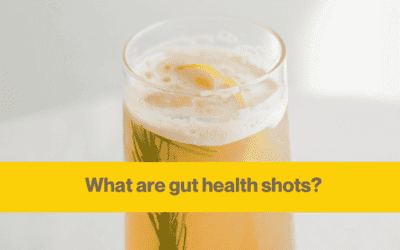Are you trying to lose weight? You might be focusing on how to get the right balance of carbs and proteins, the importance of exercise and sustaining dietary change.
But here are some less obvious tips for weight loss you may not have thought of:
1. Optimise your gut health
Balancing the microbes in our gut can make a huge difference to our overall health. We have more bugs in our gut than human cells in our whole body (around 10 times more) and these bugs work on our metabolism.
We know that people who are overweight have different microbes to those who are thinner. It’s not always clear whether the microbes afect the weight, or weight affects the microbes.
But this could mean some microbes help us extract more calories from our food than others.
So you might be eating the same as someone else, but your bugs are making you keep up to around 2% more calories than them.
That doesn’t sound like much but over time that will add up.
2. Get accountable for your changes
Weight loss clubs are built on this principle: people who lose weight together are more motivated, and generally lose more weight. I’m not a fan of the mainstream weight loss clubs for several reasons, one of which is the focus on calorie counting with limited regard for nutrients.
There is also quite an unhealthy focus on removing fats from the diet, more on this later on.
However, working with people in a group will help you hit your goals, or getting an accountability partner. This is one of the benefits of working with me 1:1.
3. Eat slowly, chew well
When we eat, all sorts of messages are sent between the brain and our tummy. Stretch receptors in the stomach tell the brain when it’s getting full.
If you eat really fast, wolfing down your meal, these message will only get through once you’ve already finished your food, and you may eat more than you need.
There are certain messages about satiety which rely on some fats in the diet to tell the brain we’ve had enough, so very low fat diets will leave people feeling hungry.
4. Sleep is vital
When we get a bad nights sleep the next day we tend to reach for sugary carbs, or chocolate to get through our busy schedules. We need energy so our body tells us to get more in glucose. So it’s easy to see how you can eat more than you need when you’re super tired.
For those woken by a baby there isn’t much alternative, however for the rest of us we can employ good sleep hygiene.
Examples are:
- avoiding looking at screens for two hours before bed
- no caffeine after 2pm
- relaxing in a dimly lit room before bed
- or writing a journal.
When talking about diet we focus on increasing protein, drinking enough water to stay hydrated, getting out into the daylight in the morning to help reset circadian rhythms.
5. Reduce alcohol
You already know alcohol is mostly full of sugars, and empty calories. The other thing about drinking alcohol is that it often causes us to make poor food choices.
This could be either at the time of drinking or the next day.
Alcohol can also interfere with sleep causing more restlessness at night, which also leads you to look for quick release glucose foods to up the energy intake.
6. Drink more water
Sometimes we eat because we’re thirsty.
We need at least 2 litres of water a day (can be herb teas) but more if you’re in a very hot place, or you are very active. If you’re feeling hungry in between meals try having a big glass of water first.
If you’re eating well balanced diet with sufficient protein and fats you shouldn’t need to snack between meals.
7. Restricted Feeding Window (Intermittent Fasting)
Taking a break from digesting has so many benefits for our health, it’s really important to give our body a rest from food. I don’t recommend any snacks between meals, and ask most of my clients to aim for at least 12 hours overnight (e.g. no food between 7pm and 7am).
If you can extend this period of not eating overnight to 14 hours, or even 16 hours a few times a week, you will see more benefit.
Always take care to build up slowly, and don’t fast if you’re breastfeeding or pregnant, have diabetes or are on medication without advice from a healthcare professional.
8. Eat fat, the healthy kind
To lose weight we have been told we need to reduce our fats, so the low fat diet industry was born! We actually need fats in our diet for so many reasons.
For example, they help create our hormones, every cell wall is coated in fats, our brain is 60% fat, and neurotransmitters rely on fats.
We need some fats from plant based sources like avocado, nuts, seeds, coconut oil, as well as oily fish like salmon, anchovies and herring.
If you’d like to make changes to your health and work with me to ensure these are sustainable, get in touch for your free 15 min consultation. I will look at your health history and current symptoms, and then consider any further testing that may be required. I recommend a nutrition plan with meal ideas and foods to eat more / less of tailored to your health conditions. Contact me to start your healthy weight loss journey.
Your Action Points – How to lose weight
As well as looking at what you eat, and exercise consider the following areas. If you need help implementing any of this please get in touch for more support.
- Look after your gut health.
- Get accountable for your changes
- Chew your food and slow down to eat
- Reduce alcohol
- Get enough sleep
- Drink sufficient water so you don’t confuse hunger for thirst
- Try intermittent fasting – this doesn’t work for everyone, but many find it accessible and easy to follow.
- Include healthy fats, don’t use sugary laden ‘fat free’ products, these aren’t always healthier.

IBS Nutritionist
Hi, I'm Anna Mapson, registered Nutritional Therapist.
I help people with IBS and SIBO get control of unpredictable gut symptoms to find long term relief from painful and embarrassing IBS without restrictive dieting.
I can help you to:
- understand your digestion better, so you recognise your triggers
- eat a well balanced diet, with tasty meals that are simple to prepare
- reintroduce your trigger foods so you can get back to enjoying food again
Find more about my 3 month 1:1 Gut Reset programme.
Gut health shots – what does an IBS nutritionist think?
Lately, gut health shots seem to be everywhere. But are they any good for your digestion. And are they actually worth your hard earned money? As an IBS nutritionist, this is my specialist subject. So recently, the Sun newspaper asked me to spill the beans on gut...
Why laxatives should never be used for weight loss
Gut health trends on Tiktok such as #guttok have been responsible for spreading myths such as laxatives help with weight loss. This is completely inaccurate, and may even harm your health. As an IBS nutritionist I sometimes recommend people use laxatives for...
Bile Acid Diarrhoea – A Forgotten Reason For IBS-D?
Struggling with IBS-D? Did you know it could be related to bile acid diarrhoea (BAD)? You might not have heard of this, but some studies show that around 34% of people with Diarrhoea predominant IBS may have bile acid malabsorption. What are bile acids? Bile is made...




